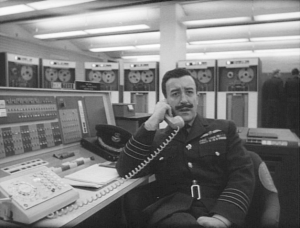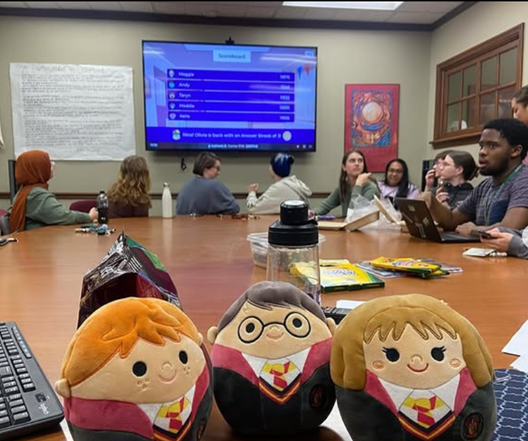Editor’s Note: Welcome to Adjacent Meanings, a new column by writer Leo Gray, ’16. This column will be devoted to exploring the world of movies and art, particularly older films, in the coming weeks.
A seemingly cool headed General Jack D. Ripper (Sterling Hayden) shifts into a chair behind his desk. A bold chiaroscuro outlines his harsh features while a lowered camera angle nearly deifies him. The General is an impending figure of authority, who has sent plans to thirty-some planes flying outside of Russia to deploy all the nuclear missiles they’ve got. His stoic demeanor in facing what he has done terrifies a trembling Group Captain Mandrake (Peter Sellers). Ripper removes his cigar momentarily, and his gruff voice crunches out: “I can no longer sit back and allow Communist Infiltration, Communist Indoctrination, and the International Communist Conspiracy to sap and impurify our precious bodily fluids.”
The sentence is almost hilarious to us now. The contradiction between the authoritarian image and the absurd dialogue is astounding, but Stanley Kubrick planned it that way. Dr. Strangelove or: How I Learned to Stop Worrying and Love the Bomb (1964) is a satirical comedy that mocks basically everyone who lived during the nuclear scare of the sixties. It portrays the air force, army, politicians and more as incompetent morons who let the world go to hell from the machinations of General Ripper. However, Kubrick manages to handle this touchy subject very carefully. Without prior knowledge of its satirical nature, Dr. Strangelove could very well be confused with a straight up propaganda film.

Here’s a simple version of the intricate narrative: Wing Attack Plan R is put into action by General Jack D. Ripper of Burpelson Air Force base. R was written just in case Washington and every other major city in America was bombed to hell by the Russians. It puts all the power into any air force general’s hands to retaliate. So he closes down the base and Group Captain Mandrake is the only person there that knows, by way of radio, that no such Russian nuclear strike has occurred. Meanwhile, the President, his advisors and the Russian Ambassador meet in the War Room, where there is no fighting.
The third plot line running concurrent with the War Room meeting and the Ripper-Mandrake confrontation is the struggle on Major T.J. “King” Kong’s plane, which is one of those flying around Russia carrying tons of nuclear power. Kong and the crew press on towards their target despite being hit with a Russian missile attack. The three plot lines weave in and out throughout the movie, creating a story that transitions from the plane to the war room to Ripper’s base seamlessly.
Apparently Columbia Pictures didn’t have a whole lot of faith in Kubrick on his own, and so they just about forced Sellers’ involvement in Dr. Strangelove. Thank God they did. Sellers, star of the Pink Panther movies and many more, played three roles wonderfully: Group Captain Lionel Mandrake, President Merkin Muffley, and Dr. Strangelove. He was originally supposed to play Major Kong also, but felt he wasn’t right for the part. Kubrick, a notorious perfectionist, gave Sellers a surprising amount of leeway in his dialogue and acting. A large amount of his lines were improvised, and the now-classic Dr. Strangelove “hand” scene (you’ll know what I mean when you see it) was off the cuff. Sellers demonstrated a huge breadth of ability here, and won the Academy Award for Best Actor because of it.
Though, maybe some don’t find General Ripper’s views on Communism as humorous. Many out there still fear the “threat” of America descending into Communism or Socialism and here we have just another great aspect to Kubrick’s black comedy. The fears and concerns that Dr. Strangelove portrays are still relevant today—not only as far as Communism goes, either. The term “nuclear scare” may not necessarily apply anymore, but nuclear weapons will play into international politics for years to come. Or at least until we have total disarmament. (Pfft, yeah right.)
Dr. Strangelove plays at the Charles Theatre on Saturday, Sept. 27 11:30 a.m..and Monday, Sept. 29 7 p.m.
Tweet the writer: @NotEvenALeo










































































































